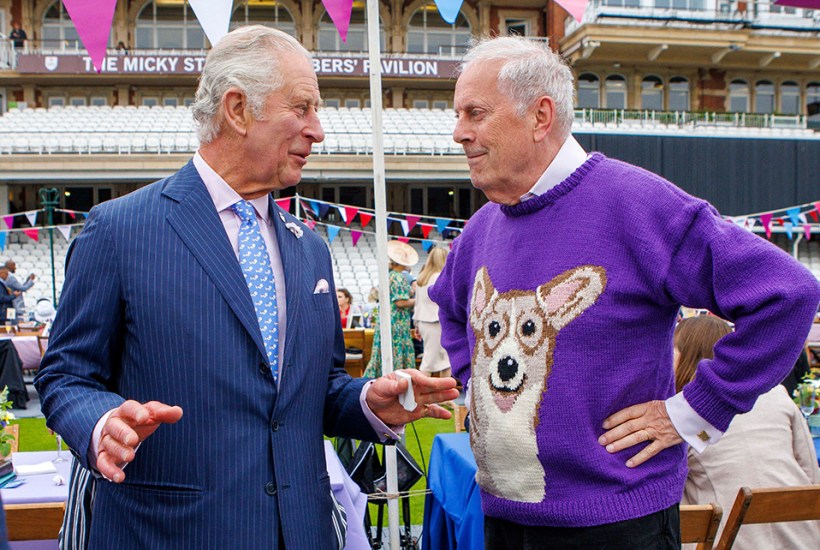Once, years ago, making small talk with Elizabeth II, I asked her if it was true that many peers attending her coronation in 1953 had taken sandwiches into Westminster Abbey hidden inside their coronets. ‘Oh, yes,’ she said. ‘They were in the abbey for something like six hours, you know. The Archbishop of Canterbury even had a flask of brandy tucked inside his cassock.’ Apparently, His Grace offered Her Majesty a discreet nip, but she declined.
When I pressed the Queen for any amusing recollections of the great day, she did recall the moment, after the crowning, when England’s premier baron, William Stourton (22nd Baron Stourton, 26th Baron Segrave and 25th Baron Mowbray), came forward to pay homage. As the noble lord, whose titles dated back to 1283, when Edward I was king, retreated backwards from the throne, the poor fellow almost fell over. ‘His robe – which had been used by generations of the family – bunched up around him, with moth balls and pieces of ermine flying all over the place.’ This could explain why the peers in attendance this weekend were initially instructed not to dig out the family coronation robes. At the last minute, they have been allowed to dress as they please, but advised to check for moth balls first.
Elizabeth II certainly remembered the best quip from the day. She only heard about it afterwards, but it made her laugh out loud. Crowned heads from around the world came to London for the event and one of them was Queen Salote of Tonga. She was a magnificent lady, aged 53 in 1953, very tall (6ft 3in) and splendidly built. She travelled to the abbey in an open carriage sitting opposite the comparatively diminutive Sultan of Kelantan. Someone asked Noël Coward: ‘Who is that with Queen Salote?’ ‘That,’ replied the playwright, ‘is her lunch.’
Coward’s quip went around the world and, 20 years later, when Prince Philip was on a visit to Malaysia, he met a group of VIPs at a reception and was much amused when the shortest member of the party introduced himself with a squeal of pride: ‘I’m the lunch!’
As a rule, Noël Coward is one of my favourite diarists, but his record of 2 June 1953 is disappointingly straightforward: ‘Tuesday, coronation day, I spent at home watching the proceedings on television, most excellently done. The English State Ballet at its best. Weather foul and everyone soaked.’
Much more fun is the unpublished diary of Vyvyan Holland, the son of another great playwright, Oscar Wilde. Holland’s son Merlin kindly let me dip into his father’s journal when I was writing my recent biography of Elizabeth II. Vyvyan Holland’s Australian wife, Thelma Besant, was the Queen’s make-up consultant through the 1950s and in charge of the ‘royal face’ on coronation day. Thelma was devoted to Her Majesty, but her husband had royal reservations. A few days before the coronation, he reported in his diary: ‘We took an expensive taxi (15/-) to go to see the show in Parliament Square, Whitehall, etc. It is, of course, all very grand, but the whole thing is too mediaeval and barbaric for my liking. It is only the fact of having a young Queen that makes the thing possible at all. With an old goat like Edward VII the situation would become absurd.’ Later he recorded, clearly chuckling to himself: ‘I have started a rumour that the footmen standing at the back of the coronation coach are really eminent physicians in disguise, just in case the Queen is taken queer.’
Having not so long ago played Lady Bracknell in Oscar Wilde’s The Importance of Being Earnest, and (when considerably younger and prettier) having given my Rosalind in As You Like It and Chinese princess in Lady Precious Stream, I have never had a problem with gender-fluid and colour-blind casting. It can sometimes help the audience to look at a familiar work in a new way – as it does with the thrilling production of Richard III at the Rose Theatre in Kingston. Bridgerton star Adjoa Andoh plays Richard not as a hunchback but as the only black woman in the Cotswolds. Shakespeare’s play (not a word of the original is altered) is set in a bucolic but brutal 15th-century world that includes Morris dancing. It works – and resonates in the time of Putin and war-torn Sudan.
I thought of our new King, too, towards the end of the play. Richard is dead and his successor, Henry VII, is handed the crown with this instruction: ‘Wear it, enjoy it, and make much of it.’ It is a line with which Charles – a profound lover of Shakespeare – will be familiar. I reckon he will make much of it. He is a good man. I hope he finds time to enjoy it, too.
Got something to add? Join the discussion and comment below.
Get 10 issues for just $10
Subscribe to The Spectator Australia today for the next 10 magazine issues, plus full online access, for just $10.
You might disagree with half of it, but you’ll enjoy reading all of it. Try your first month for free, then just $2 a week for the remainder of your first year.








Comments
Don't miss out
Join the conversation with other Spectator Australia readers. Subscribe to leave a comment.
SUBSCRIBEAlready a subscriber? Log in